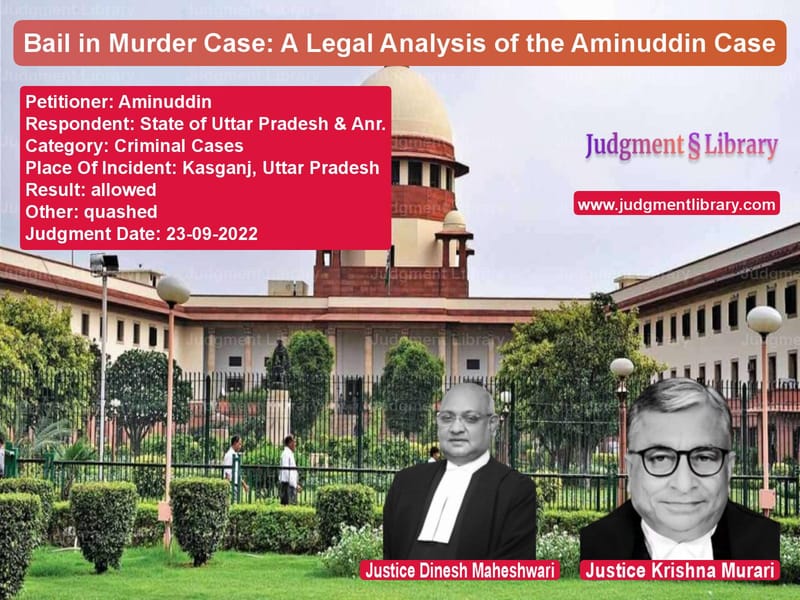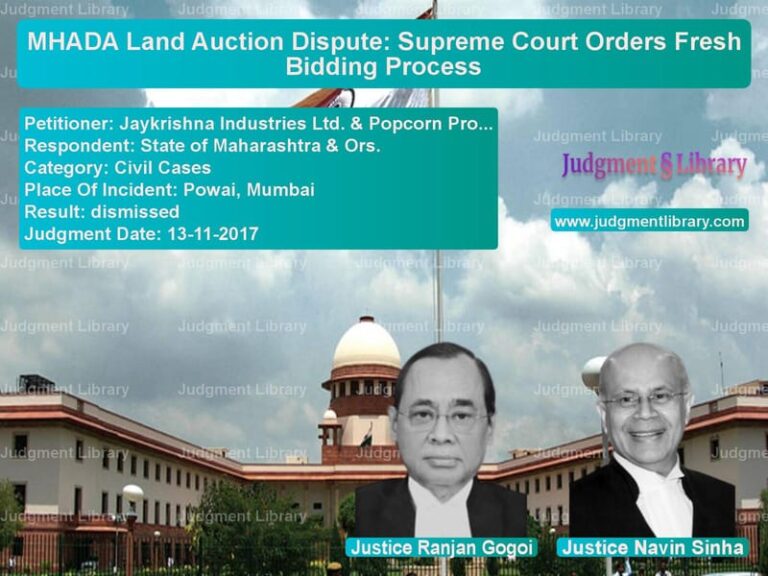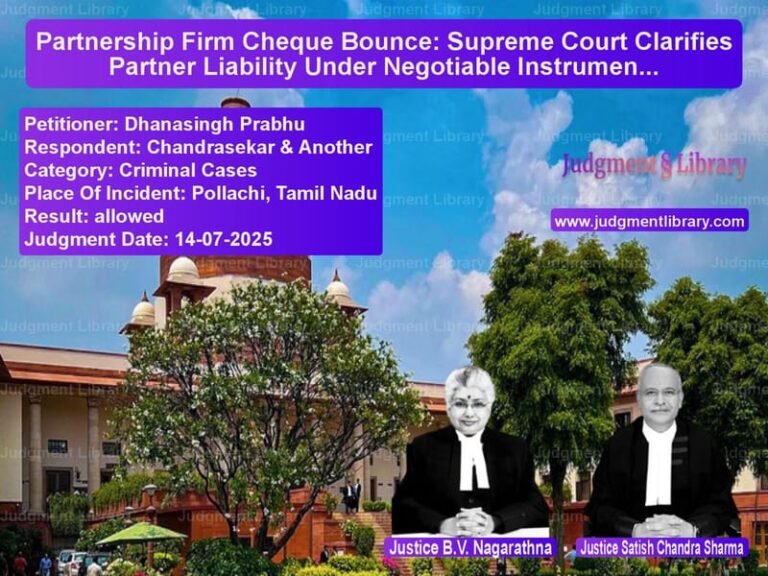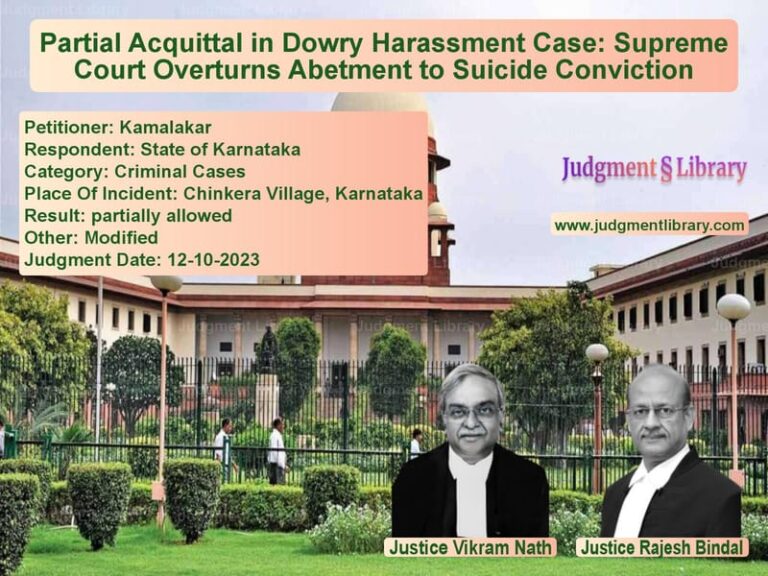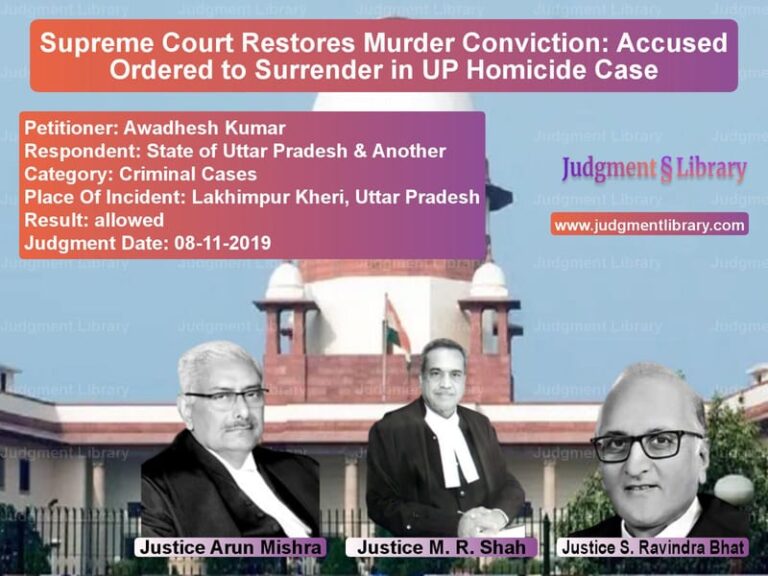Bail in Murder Case: A Legal Analysis of the Aminuddin Case
This case concerns a criminal appeal filed by Aminuddin, challenging the order passed by the High Court of Allahabad granting bail to one of the accused, Respondent No. 2, in a brutal murder case. The appellant, Aminuddin, had lodged an FIR against the accused for the murder of his son, Danish, who was attacked by seven persons with sharp weapons. The High Court granted bail to the accused, citing parity with identically placed co-accused persons. The appellant opposed this order, claiming that the High Court had failed to consider the seriousness of the crime and the fact that the co-accused’s bail had already been disapproved by the Supreme Court in a previous case. The Supreme Court was called upon to examine whether the High Court’s decision to grant bail was appropriate in light of the facts and the law.
The facts of the case revolve around the brutal murder of the appellant’s son, Danish, on 10th July 2019. Danish was attacked by seven persons when he was on his way to milk cattle, and he died on the spot from multiple stab wounds. Two eye-witnesses, Nisar and Jalil, were present at the scene and later testified. The police registered FIR No. 438/2019 under Sections 147, 148, 149, 302, 352, and 34 of the IPC. One of the accused, Imran, was arrested on 11th July 2019, while the others, including Respondent No. 2, remained absconding. Non-bailable warrants were issued, and Respondent No. 2 surrendered on 2nd September 2019. A series of bail applications followed, with the High Court granting bail to Respondent No. 2 on 3rd December 2020, relying on the fact that other co-accused had been granted bail on similar grounds.
The appellant challenged this order, arguing that the High Court’s decision to grant bail was based solely on the bail granted to identically placed co-accused, without proper consideration of the gravity of the crime. The appellant also highlighted that the order granting bail to the co-accused had been set aside by the Supreme Court in a separate appeal. Furthermore, the appellant argued that the High Court did not take into account the fact that the murder was a daylight attack with gruesome injuries, and the nature of the crime should have weighed heavily against granting bail.
In contrast, the respondent’s counsel contended that the High Court had correctly granted bail based on the principle of parity, as the co-accused had been granted bail under similar circumstances. The respondent’s counsel also emphasized that the respondent had no criminal history, had been in custody since 2nd September 2019, and that the trial was likely to take a long time to conclude. The respondent’s counsel further argued that no specific role had been attributed to Respondent No. 2 in the incident, and that the prosecution’s case was weak, as it was scientifically implausible for seven people to have inflicted wounds with seven knives at the same time.
The Supreme Court, upon hearing the parties, observed that the High Court’s decision to grant bail was flawed, as it was based primarily on the earlier bail granted to the co-accused. The Supreme Court noted that the bail granted to the co-accused had been disapproved in a previous case, and therefore, the basis of the High Court’s decision was no longer valid. The Court emphasized the need for the High Court to consider all relevant factors, including the seriousness of the crime, before granting bail. The Court further observed that the High Court had failed to give adequate reasoning for its decision, which was a crucial aspect of a reasoned judicial order.
The Supreme Court referred to its previous judgments, including the Mahipal v. Rajesh Kumar case, which highlighted the importance of providing a reasoned judgment in bail matters. The Court stated that merely referencing the larger mandate of Article 21 of the Constitution was insufficient to justify the granting of bail in such a serious case. The Court also stressed that the protection of personal liberty under Article 21 must be balanced with the public interest and the interests of justice, especially in cases involving violent crimes such as murder.
The Court further noted that the respondent had been specifically named in the FIR as one of the assailants, and there was no reason to doubt the prosecution’s case at this stage. The nature of the crime, with its brutal and gruesome nature, and the fact that the victim was attacked with multiple sharp weapons, made it a case where bail should not have been granted. The Court observed that the High Court had failed to consider these critical factors and had granted bail based on the fact that the co-accused had been granted bail earlier, which was not a valid basis for such a decision.
In conclusion, the Supreme Court allowed the appeal and set aside the High Court’s order granting bail to Respondent No. 2. The Court directed that the respondent must surrender and remain in custody. The Court also left open the possibility for the respondent to apply for bail again after surrendering, but only at an appropriate stage, and after due consideration of the merits of the case. The Supreme Court made it clear that its decision did not prejudge the outcome of the trial and that the respondent’s rights to a fair trial remained intact.
Petitioner Name: Aminuddin.Respondent Name: State of Uttar Pradesh & Anr..Judgment By: Justice Dinesh Maheshwari, Justice Krishna Murari.Place Of Incident: Kasganj, Uttar Pradesh.Judgment Date: 23-09-2022.
Don’t miss out on the full details! Download the complete judgment in PDF format below and gain valuable insights instantly!
Download Judgment: aminuddin-vs-state-of-uttar-prade-supreme-court-of-india-judgment-dated-23-09-2022.pdf
Directly Download Judgment: Directly download this Judgment
See all petitions in Bail and Anticipatory Bail
See all petitions in Murder Cases
See all petitions in Fraud and Forgery
See all petitions in Custodial Deaths and Police Misconduct
See all petitions in Theft and Robbery Cases
See all petitions in Judgment by Dinesh Maheshwari
See all petitions in Judgment by Krishna Murari
See all petitions in allowed
See all petitions in Quashed
See all petitions in supreme court of India judgments September 2022
See all petitions in 2022 judgments
See all posts in Criminal Cases Category
See all allowed petitions in Criminal Cases Category
See all Dismissed petitions in Criminal Cases Category
See all partially allowed petitions in Criminal Cases Category

